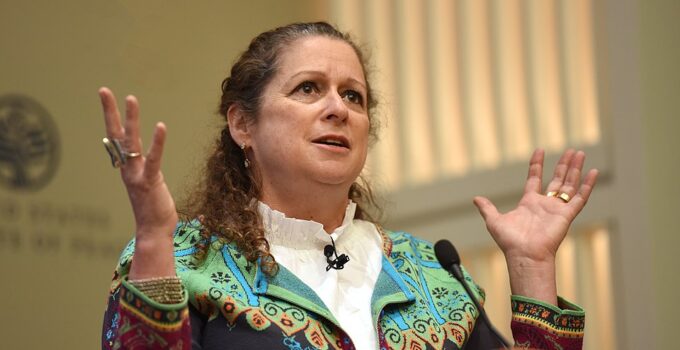Abigail Disney, the granddaughter of Roy O. Disney (who co-founded The Walt Disney Company), has never been shy about criticizing the billionaire class — even though she comes from it. In a new interview with Fortune, she once again called out the ultra-wealthy for hoarding money while refusing to fix the systems they benefit from.
Her message is blunt: if you’re a billionaire who refuses to share your wealth, you’re part of the problem. And in her words, that makes you a “sociopath.”
That may sound extreme. But Abigail isn’t just talking. She’s also walking the walk — and calling on others, especially billionaires, to do the same.
Not Your Typical Heiress
Abigail Disney inherited a fortune. But instead of trying to grow it, she’s spent much of her adult life giving it away.
She’s a filmmaker and activist who’s made it her mission to speak out against inequality. In recent years, she’s been particularly vocal about corporate greed, wealth concentration, and the idea that extreme wealth is something to be proud of.
In her Fortune interview, she explained that she’s been actively giving away most of her wealth because she believes billionaires should not exist at all. She calls herself a “traitor to her class” — and she’s okay with that.
Why She’s So Angry
Abigail says that most billionaires could afford to give away large portions of their money and still be richer than almost everyone else on the planet.
She points to MacKenzie Scott — the ex-wife of Amazon founder Jeff Bezos — as a model example. Scott has given away more than $16 billion to nonprofits in just a few years, often without strings attached or detailed grant applications. It’s fast, efficient, and focused on people who need help now.
Abigail believes other billionaires could easily do the same — but they choose not to.
And that’s where the frustration lies. In the interview, she says it’s “completely sociopathic” for billionaires to hoard resources when they have the power to fix real problems like hunger, homelessness, and climate change.
The Problem With Philanthropy
Abigail doesn’t just want rich people to donate more. She wants them to question the system that made them rich in the first place.
She argues that many wealthy individuals use philanthropy as a way to look generous — without giving up any real power. Donations often come with rules, conditions, and publicity. But the core system of inequality remains untouched.
In her view, real generosity means shifting power, not just writing checks. That includes paying higher taxes, supporting stronger labor protections, and embracing regulations that prevent wealth from being concentrated at the top.
She calls out her fellow elites for resisting these changes while pretending to care. “They want to play God,” she says, “but they don’t want to be held accountable.”
MacKenzie Scott vs Everyone Else
MacKenzie Scott stands out not just for how much she gives, but for how she gives.
She avoids red tape. She trusts nonprofits to use the money however they see fit. And she doesn’t require endless reporting or branding. In short, she treats giving as a way to help — not control.
Abigail sees this as the gold standard. But she also notes that most billionaires don’t follow it. They create foundations that operate like businesses. They tie up money in structures that protect their influence. And they continue to benefit from tax breaks while controlling the narrative.
Scott, in contrast, has chosen to dismantle her own power. That, Abigail says, is what true philanthropy should look like.
Should Billionaires Even Exist?
This is the question at the heart of Abigail’s message.
She doesn’t believe it’s moral — or even practical — for individuals to control that much wealth while millions of people struggle to afford food, healthcare, or shelter.
And she’s not alone. Public support for taxing the rich has grown in recent years. Movements like “Tax the Rich” and “Eat the Rich” have gained traction online. Politicians in the US and abroad are proposing wealth taxes, corporate transparency laws, and limits on CEO pay.
Abigail sees this shift as a sign of hope. But she warns that unless wealthy people start taking real action, public anger will continue to rise — and could lead to instability.
A Call to Action
Abigail isn’t just complaining. She’s urging other wealthy people to join her in redistributing their wealth now — not later.
She believes philanthropy should focus less on PR and more on justice. She wants foundations to be faster, leaner, and more focused on long-term impact. And she’s challenging fellow elites to see giving not as a choice, but as an obligation.
“If you’re a billionaire and you’re not actively dismantling your own power,” she says, “then you’re part of the problem.”
What This Means for the Rest of Us
Most people reading this aren’t billionaires. But the conversation matters because it raises bigger questions about fairness, responsibility, and how we define success.
It also reminds us that real change doesn’t just come from giving money — it comes from giving up control. That’s something even non-billionaires can think about when supporting causes, voting for policies, or running businesses of their own.
Abigail Disney isn’t saying she has all the answers. But she’s clear about one thing: the current system favors the rich, and it’s time to change that — starting with those who have the most.

Jordan Ellis is a business writer and digital strategist at Hustle Framework, focused on practical tools and actionable insights for entrepreneurs. Passionate about helping you make smarter business decisions.




